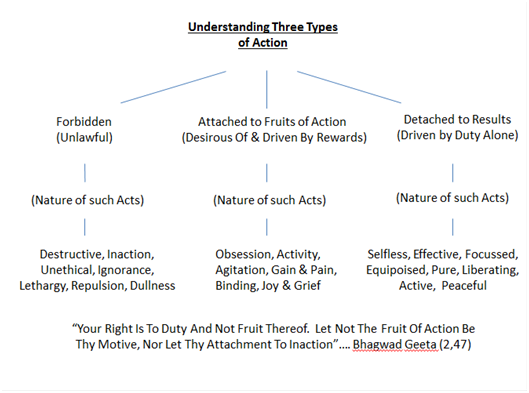Super- Consciousness, nature and material make the world. Super-Consciousness undergoes no change while nature including material keeps changing. Our soul is what we normally call our consciousness. It is a part of Super- Consciousness. When it comes in connect with the body it can be misled to believe it’s purpose as fulfilment of human desires. Thus confusing itself to be the mind and the body, it could suffer outcomes of action. On the other hand, it may remain oblivion to doings of mind and body and be just an observer. Mind could draw inspiration from it and treat actions as mere duty without getting affected by the outcome. Thus our consciousness assumes one of the two states at any given point in time indicating it’s closeness to either the Super – Conscious or the body. When body pursues an act, the soul can either feel attached or completely detached to such activity. “Your right is unto duty and not fruit thereof, let not the fruit of action be thy motive nor let thy attachment to inaction” reads Bhagwad Geeta ( 2,47).
Action is split into three categories:
1. Forbidden – unlawful
2. Attached – driven by outcome
3. Detached – driven by duty alone
Principle of cause and affect shall apply in any case, but if the mind is focussed on outcome, it would fail in focus and total concentration in the act. Also would it elevate or sulk depending on the outcome, favourable or otherwise and thus lose equilibrium.
Let us apply this to an employee’s role in office.
1. Indiscipline, cheating, defying learning and norms are an example of Nishidha Karma (forbidden acts).
Outcome: Damage and loss to the company, employer would terminate contract someday.
2. Hard work with eyes set on promotion, sacrificing long term gains for immediate benefits at times ( for example manipulation by sales team to oversell stocks to earn month end incentives) are examples of Sakaam Karma (desire – prompted acts).
Outcome: Promotion and monetary gains at job. Current compromises could emerge as future problems. Desires keep mounting, so does agitation within, but it does result into mental and material growth.
3. Hard work with full dedication without expectation of fall-outs, thus considering every act an affair between oneself and God is an example of Niyatam Karma (duty driven acts).
Outcome: Health and peace are maintained. In addition to mental and material growth, one grows spiritually.
Moral: One needs to keep self-talking the teaching by Lord Krishna in Geeta and continue practicing Niyatam Karma (duty driven act). This would benefit one’s own self and society in general.


Leave a Comment